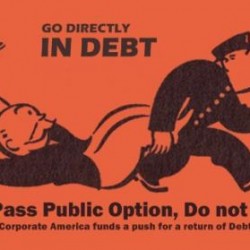So What Happens to Debt Upon Death?
“You can’t take it with you.“ So goes the age-old adage. Nevertheless, the statement is not an excuse to go nuts with one’s credit cards or paycheck, during a weekend getaway to Vegas. However, as it relates to credit card debt, oftentimes, one can actually do just that…take debt to the grave. To determine if this is indeed the case, the question instead then becomes whether a decedent’s debt is to be paid by the person’s estate or a surviving family member?
Upon death, assets that belong to a decedent’s estate are liquidated to determine what monies (if any) are available to its creditors. State law requires that the person’s estate, by way of its executor or administrator, satisfy creditors first. Once creditors are squared away, the state then allows the estate’s remainder to be distributed according to the decedent’s wishes (per their will) or the state’s mandates (without a will).
NOTE: Payable on death (P.O.D.) accounts (i.e. directed bank accounts, retirement funds, life insurance, etc.) are not included in a decedent’s estate and are not within the reach of creditors, upon a person’s death.
Generally speaking, there is typically no money left over to pay credit card companies once a person passes and senior creditors are paid from their estates. However, a credit card company could potentially be paid, if the decedent had a joint account holder or surviving spouse in a community property state. In either of the immediate scenarios, the surviving account holder would become 100% responsible for satisfying that person’s debt upon death.
NOTE: Credit card debts will not ordinarily pass to relatives, friends, or authorized users of the decedent’s credit card upon their death.
Lastly, if a decedent was in progress of filing bankruptcy, prior to their untimely death, the surviving spouse and/or estate could also be alleviated of the person’s credit card debt, as a discharge will still be granted, following their death.
If you’re concerned about leaving your loved one’s with debt, after you’ve passed, contact REFUGE Law to address your sensitive questions or concerns. Make an appointment to speak with one of our experienced bankruptcy attorneys. Call us today at (404) 618-2733 in Georgia, (713) 570-6377 in Texas, to discuss.
[maxbutton id=”1″]
Tag: bankruptcy
5 Things to Avoid Before Filing Bankruptcy
Bankruptcy Pitfalls to Avoid…
If a bankruptcy filing is in your near future, be mindful of a few DON’Ts, prior to proceeding:
- DON’T surrender to creditor harassment and cash out your 401k or IRA accounts to repay credit card debts: (a) you could potentially realize stiff penalties for removing those funds, prior to retirement age and (b) retirement funds are protected, under the bankruptcy code. Essentially, continue to let your retirement funds grow, while you work, until those funds are later needed to take care of you, when you don’t work (during retirement).
- DON’T run up your credit cards or incur large amounts of debt prior to filing, simply because you have “available credit” remaining on your cards or line of credit. To a bankruptcy trustee, this could be misconstrued and result in serious implications, one of which being that your latest shopping spree won’t be dischargeable.
- DON’T repay money to friends or family that you previously borrowed, immediately prior to filing bankruptcy. It’s always a good idea to make good on our promises to repay friends and/or loved ones, especially when we might have to call on another favor again someday. However, repaying money to that same family member or colleague, typically within one year of filing bankruptcy, is subject to being taken back by the court’s trustee. Don’t do it or you and the other person will be left shaking your heads.
- DON’T file bankruptcy when you anticipate a substantial income tax refund. Without an adequate exemption, which your bankruptcy attorney will assist in determining, the court’s trustee will be ready, willing and able to assist in relieving you of any excess funds you anticipated receiving.
- DON’T listen to advice from friends or relatives, regarding binge spending or miscellaneous things to do (before filing bankruptcy), unless the friend or relative happens to double as your bankruptcy attorney. There’s a lot of misinformation available to an eager debtor. However, bankruptcy code changes in 2005 were made to deter debtors from fraudulent filing activity. Trust an actual bankruptcy attorney that knows the facts versus second-hand information about filing from your peers.
While this is not an exhaustive list of things to avoid before filing bankruptcy, it is intended to provide a general overview of select items that most debtors should be mindful about. If you’re seriously contemplating a bankruptcy filing, contact REFUGE Law to address any questions or concerns, relating to additional things to avoid, before your bankruptcy filing. Make an appointment to speak with one of our experienced bankruptcy attorneys. Bankruptcy can help provide you relief from your financial worries. Call us today at (404) 618-2733 in Georgia, (713) 570-6377 in Texas, to discuss.
[maxbutton id=”1″]
Use Bankruptcy To Stop Wage Garnishment
Wage Garnishment Really Sucks!
Nothing makes your bank account feel more so like it’s on a diet than a wage garnishment. Not only is wage garnishment downright humiliating, the financial bite alone can leave a person or family feeling violated, as if they had just been pickpocketed by an invisible hand.
What is a Wage Garnishment?
Generally speaking, a wage garnishment is a tool used by creditors to secure court permission to “tap” an individual’s bank account or withhold a portion of their paycheck(s) to satisfy an outstanding debt. Typically, wage garnishments happen when times are already pretty tight for a borrower, which essentially brings to mind the old catchphrase, “Robbing Peter to Pay Paul.”
Are There Limits to Wage Garnishment?
Yes. In general, the following limits apply to wage garnishment:
- Employers cannot take more than 25% of an employee’s disposable earnings for garnishment, even if 100+ creditors are fighting over garnished funds.
- Employers cannot take more than the excess of your earnings over 30 times the federal minimum hourly wage (currently, $7.25/hour). Therefore, this means that $217.50 (or 30 x $7.25) is safe from each of your paychecks.
- Some states also allow specific living expenses to be exempt from wage garnishment.
Can Filing Bankruptcy Stop a Wage Garnishment?
Yes, filing Chapter 7 or Chapter 13 Bankruptcy essentially enables the automatic stay to stop creditor’s collection efforts, thereby ceasing wage garnishment activity. If you’re already behind on creditor payments or there’s a pending lawsuit on the horizon, a garnishment is quite possibly the creditor’s next course of action. It might be in your best interest to consider filing bankruptcy to prevent a creditor’s inevitable pickpocket attempt. A garnished paycheck equates to money that you could have used for groceries or bills in your own household.
If you’re worried that creditors could be gearing up to garnish your wages, contact REFUGE Law to keep your disposal income safe and sound. Make an appointment to speak with one of our experienced bankruptcy attorneys. Bankruptcy can help give you relief from your financial worries. Call us today at (404) 618-2733 in Georgia, (713) 570-6377 in Texas, to discuss.
[maxbutton id=”1″]
Your BFF – Your Bankruptcy ‘Fore Foreclosure (Stops Foreclosure)
What’s a BFF?
The term BFF, or Best Friends Forever, has grown to be used largely as a result of television shows (i.e. Friends), social media, and its popularity, in general, along with other acronyms of late (like LOL, SMH, etc.). BFF is used to highlight an extreme bond held between two people. Could be that they grew up together, went to the same high school, shared deep secrets or something else that connects them. Essentially, a BFF is a person that one can rely upon.
Just like a close personal friend, homeowners too can call upon a BFF to help through a rough time he or she might be facing (i.e. right before losing their home). However, this BFF isn’t a special friend per se, but a plan of action – your Bankruptcy (Be)’Fore Foreclosure. Read on to learn how this BFF can help you as a homeowner.
What is Foreclosure?
Foreclosure is your BFF’s enemy. Foreclosure starts when a homeowner falls behind on their mortgage payments (usually by +/- three months). In efforts to get loan repayment underway, the lender initiates legal steps against the homeowner to sell their property at auction. However, the lender must follow a process, which typically happens over a period of time, before the actual foreclosure occurs. After receiving foreclosure notice, the homeowner has time to try alternatives, before actually losing the property (i.e. deed in lieu of foreclosure, loan modification, short sale, etc.). In the event alternate options are unsuccessful, it’s then probably a good time to employ your BFF, which could possibly stall or avoid foreclosure altogether.
Your BFF’s Friend – The Automatic Stay (“The Blocker”)
Your BFF has some very strong connections when called upon. Your BFF goes to battle immediately on your behalf, by using a crucial tool in its arsenal called the Automatic Stay (or order for relief). When you file a Chapter 7 or 13 (bankruptcy before foreclosure), the court automatically issues a “stay,” or order, which in essence lowers an iron curtain, thereby blocking and/or directing your creditors to cease their collection efforts immediately. After your BFF steps in, if your home was slated for an actual foreclosure sale date, the sale would need to be legally postponed for three to four months. Nevertheless, not to get too excited, your BFF’s friend’s power could be limited, if your lender can prove that either something was fishy with your filing or if the foreclosure notice was filed, in advance, and your notice period timely expired, thereby allowing the lender to file a motion to lift your stay.
If you are worried, after receiving a notice of foreclosure, contact REFUGE Law to see if we can look for options or employ your BFF to alleviate foreclosure concerns. Make an appointment to speak with one of our experienced bankruptcy attorneys. Bankruptcy can help give you relief from your financial worries. Call us today at (404) 618-2733 in Georgia, (713) 570-6377 in Texas, to discuss.
[maxbutton id=”1″]
Rated PG & Bankruptcy
Personal Guarantees & Bankruptcy…
When we were kids, our parents were leery of sending us to a theater alone because movies, Rated PG (or above), probably had content that would not be suitable for children. While a movie’s rating of PG would definitely grant us a ticket and admission into a movie by ourselves, a PG rating implied that parental guidance was strongly advised. Essentially, a parental guidance rating warranted that our parent(s) see the movie prior to us being granted their blessing. In turn, their preview allowed us to enter the theater and enjoy a movie we’d been dying to see on our own.
Conversely, while we had the benefit of a parent to help us make decisions about movie choices as kids, most small business owners don’t pause to seek out the same of professionals, when it comes to taking on debt to fund their business goals. Oftentimes, a fledgling, small business owner goes it alone, without acknowledging the extent of his or her own personal liability before absorbing debt. Had the small business owner simply taken the time to ask for advice of a professional, he or she would have discovered whether or not the debt obligation they’d undertaken had a personal guarantee.
While a teen movie’s PG rating wasn’t too detrimental to us as kids, a PG rating, with regard to debt, can be extremely hazardous to a small business owner’s financial health.
What is a Personal Guarantee (PG)?
A personal guarantee obligates a person to repay a loan, as it is a contractual promise to fulfill a debt. A person’s promise to repay his or her obligation is either backed by property, which is debt secured by collateral, or his or her personal creditworthiness, which is unsecured debt.
Most personal guarantees are dischargeable with bankruptcy. However, some PG’s are not dischargeable, because the underlying debts are not dischargeable. Debts that fall into this category are student loans, tax debts that are less than 3 years old and/or are attributable to fraud or willful evasion, and some hold harmless, domestic agreements (i.e. found in divorce cases).
Who’s on the Hook for Personal Guarantees?
Individual/Sole Proprietor: If you personally take on debt, then you are personally liable to repay said debt. Likewise, if you are an unincorporated business owner, all liability belongs to you as owner, along with debts you’ve incurred, since no business exists to absorb debt.
Co-Signor: If you personally guarantee someone else’s loan (co-sign) and they default, followed by subsequently filing bankruptcy, then you, as their co-signor, are left holding the bag to fully absorb the debt.
Company: Most small business debts are personally guaranteed. While incorporated small business owners may have protections that sole proprietors do not, it comes as a surprise to some, if not most, small business owners that they are on the hook to repay their company’s debts (as personal guarantors), should their company pursue bankruptcy protection. In the minority of cases, if debt is not personally guaranteed, then the creditor must pursue business assets to collect.
If you are concerned that you may have personally guaranteed a loan and are contemplating bankruptcy, contact REFUGE Law to see if your debt is Rated PG. Make an appointment to speak with one of our experienced bankruptcy attorneys. Bankruptcy can help give you relief from your financial worries. Call us today at (404) 618-2733 in Georgia, (713) 570-6377 in Texas, to discuss.
[maxbutton id=”1″]
Can I Go to Jail for Not Repaying a Debt?
Debtors’ Jail…
Debtors’ jails were used in Western Europe during the 19th century for persons that could not repay debts. However, during modern times, these institutions have been generally outlawed and are no longer used, as bankruptcy laws have granted debtors leniency. Nevertheless, debt collectors (and scam artists alike) oftentimes prey on public fears and misconceptions, ensuring that they do indeed exist to a degree. Once a debtor is on the phone, an unscrupulous creditor can spook an individual into believing that he or she will go to jail if they simply do not repay his or her delinquent debt. WRONG! Unless a person has fraudulently written a bad (“hot”) check and a creditor has filed charges against that individual for check fraud, then that person will not be arrested for falling behind on a debt, which is due a regular creditor. However, an individual could potentially go to jail for not making child support or tax payments.
NEWS ALERT: US Marshals Arresting People for Not Paying Their Federal Student Loans
When an individual receives a threat to be arrested and thrown in jail, it is usually a bogus or illegal attempt to secure payment by a debt collector or scam artist. However, when a debtor does go to jail for a debt, it is usually attributable to them being sued for an outstanding obligation, receiving a court summons, ignoring it, and subsequently, being held in contempt of court. If you receive a notice to appear in court, DO NOT IGNORE the notice or simply blow it off. Hire an attorney to assess, address, and protect your interests immediately. In addition to being held in contempt of court, and a warrant being issued for your arrest (after ignoring a summons), the judge is likely to grant the party that has sued you a default judgment. This means that you will be required to pay the amount that you were sued for, without having had an opportunity to state your case or why you cannot pay in open court.
If you are receiving harassing calls, emails, and/or letters from debt collectors, and you haven’t spoken to a bankruptcy attorney just yet, contact REFUGE Law to put an end to the madness. Make an appointment to speak with one of our experienced bankruptcy attorneys. Bankruptcy can help give you relief from your financial worries. Call us today at (404) 618-2733 in Georgia, (713) 570-6377 in Texas, to discuss.
[maxbutton id=”1″]
Which Bankruptcy Type Looks Better on My Credit – Chapter 7 or Chapter 13?
Bankruptcy Decisions…
In deciding whether to file bankruptcy or not, potential clients often ask which bankruptcy type looks better on their credit: a Chapter 7 or Chapter 13? The brief answer is that there is no real difference as to how it affects your credit. However, bankruptcy does impact your credit negatively and can remain on a person’s credit report for up to 10 years. Other things that negatively impact a person’s credit: keeping large amounts of debt, continuous late payments, repossessions, and charged-off accounts. These things, and a host of others, can stay on a person’s credit report and impact it negatively. So the question then becomes, individually, which one will have the best effect for you?
For some people, utilizing the “fresh start,” provided by a Chapter 7 filing, happens in a relatively short amount of time, as it results in the discharge of large amounts of unsecured debt, like credit card and medical debts. For some, this makes the most sense. A Chapter 7 filing can allow you to more quickly gain access to credit and begin rebuilding your credit and future. Freeing up disposable monthly income, through a Chapter 7, is sometimes the best move you can make for your overall credit.
On the flip side, it can also be argued that a Chapter 13 filing might be better suited for some people and that a lender may look more favorably upon a Chapter 13. Creditors prefer Chapter 13, as it results in a tangible plan to repay, which is administered by the bankruptcy court. Chapter 13 also alleviates creditors’ concerns, as they now know that they will recoup some, if not all, of the obligations previously extended to a debtor.
Make an appointment to speak with one of our experienced bankruptcy attorneys at REFUGE Law, PLLC to discuss your options and evaluate whether a Chapter 7 or Chapter 13 would be the right solution for you. Bankruptcy can help give you relief from your financial worries. Call us today at (404) 618-2733 in Georgia, (713) 570-6377 in Texas, to discuss today.
[maxbutton id=”1″]






